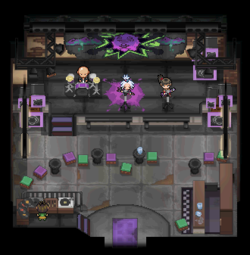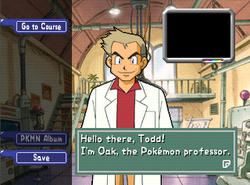Voice acting in the Pokémon games
Voice acting is when the voice of an actor, often referred to as a voice actor, is used to give voice to characters or provide narration. Some Pokémon games have full lines of recorded dialogue, such as Detective Pikachu, while others, such as the core series games, use voice acting more sparingly. Characters sometimes have voices that were created using voice samples that were synthesized to generate new speech or vocalizations.
In the core series games
The core series games have minimal voice acting, but occasionally feature brief vocals. Background music in the games often feature vocals, but they do not usually come from characters within the games' setting, with some exceptions.
In Pokémon Yellow and from Generation VI to Brilliant Diamond and Shining Pearl, Pikachu uses its cry as voiced by Ikue Otani in Pokémon the Series. In Yellow, this is exclusive to the Pikachu the player receives at the beginning of the game and not the entire species, as other Pikachu (i.e. those that don't have the player's Original Trainer ID and name) use the original cry. Most of Otani's recordings in Yellow can also be heard in Pokémon the Series episodes and Hey You, Pikachu! in less compressed forms.
From Pokémon: Let's Go, Pikachu! and Let's Go, Eevee! to Brilliant Diamond and Shining Pearl, Eevee also uses its cry from Pokémon the Series as voiced by Aoi Yūki.
Generation V
In Pokémon Black and White, the Village Bridge theme has synthesized beatboxing and enka vocal samples that can be added to the background track by speaking to the NPCs Russo (Japanese: ガッチー Gatchī) and Koontz (Japanese: れいぞう Reizō), respectively, implying that the NPCs themselves are singing their respective parts.
In Pokémon Black 2 and White 2, the background music for the Virbank Gym uses synthesized vocal samples that spell out the word "Pokémon"EN/"Dogars"JP, implied to be sung by Roxie and Nicky.
The background music for the Nimbasa Gym uses synthesized vocal samples that sing the phrases "Give me what I need" and "Are you ready?". The music and vocals seem to play as part of Elesa's performance, though the singer is unknown.
Additionally, some of the Pokéstar Studios opponents use synthesized vocal samples in their cries, namely Brycen-Man, Black Belt, Monica, F-00 (both forms), Black Door, and White Door.
Generation VIII
In Pokémon Sword and Shield, the Gym battle theme has vocals of the crowd singing along with the song that are added after the Gym Leader Dynamaxes a Pokémon. Gigantamax Pikachu and Gigantamax Eevee use vocals for their cries, similar to their standard forms. Gigantamax Meowth also uses vocals (voiced by its Japanese Pokémon the Series voice actor, Inuko Inuyama), though its standard form does not.
In Pokémon Legends: Arceus, Rei (voiced by Tatsuya Kotono) and Akari (voiced by Tamaki Fujii) make various vocalizations and grunts during gameplay, such as when throwing a Poké Ball or taking damage.
Generation IX
In Pokémon Scarlet and Violet, on the title screen, the voices of students talking and playing can be heard. A different, more energetic voice track can be heard after the game's story has been completed. The Gym battle theme has vocals of the crowd singing along with the song that are added after the Gym Leader Terastallizes a Pokémon.
In the side series games
Some side series games feature voice acting, most prominently in the form of an in-battle announcer.
Pokémon Stadium series
In the Pokémon Stadium series, the announcer (Ted LewisEN/Kōichi Hasebe (1998–99), Takeharu Onishi (2000)JP) combines various voice clip segments to describe the combatants' moves and current condition during battles in all the game's languages. In the latter two games, the Pikachu from Pokémon Yellow uses its cry as voiced by Ikue Otani in Pokémon the Series. All other Pikachu use a standard cry based on the species' core series cry.
Pokémon Battle Revolution
In Pokémon Battle Revolution, the announcer (Rodger ParsonsEN/Kenyu HoriuchiJP) once again combines voice clips to narrate the play-by-play of battles in all the game's languages.
In the spin-off games
Several of the spin-off games feature voice acting. This can vary from minor vocal parts to full scripts of spoken dialogue.
Hey You, Pikachu!
In Hey You, Pikachu!, all Pokémon use their cry from Pokémon the Series. Due to the title's Nintendo Space World '97[1] showcase, this is the earliest known instance of voice acting in a Pokémon game.
Super Smash Bros. series
In the Super Smash Bros. series, the voices of most characters from the Pokémon universe have roots in or are associated with Pokémon the Series. This can be through archived voice recordings, similar sound effects, or voice actors that regularly voice characters in Pokémon the Series. Some examples are Pikachu, whose voice actor is the same one from Pokémon the Series, and Pokémon Trainer, who has voice actors that voiced different characters in Pokémon the Series.
Pokémon Snap
In Pokémon Snap, Todd Snap and Professor Oak use short voice lines by their original Pokémon the Series voice actors, Carter CathcartEN/Kappei YamaguchiJP and Stuart ZagnitEN/Unshō IshizukaJP, respectively. While many Pokémon make generic animal sounds or other noises fitting their species, others have voice clips using their Pokémon the Series voices, such as Pikachu and Meowth. A Jigglypuff also sings the same song that the recurring Jigglypuff sings in Pokémon the Series.
Pokémon Puzzle League
In Pokémon Puzzle League, the introductory cutscene is fully voiced, and short voice clips from various Pokémon the Series characters will play when navigating menus. During battles, the participating Pokémon will also occasionally say their cry from Pokémon the Series, while human characters and Team Rocket's Meowth may chime in about the player's performance. Opponents will also say a short voice clip before and after battles.
Pokémon Channel
In Pokémon Channel, all Pokémon use their cry from Pokémon the Series. Channel host Pokémon as well as Pikachu speak extensively, though in Pokémon language. Meowth is an exception, as it speaks in full human-language sentences.
Pokémon Garden
In Pokémon Garden, the Pokémon Special Tour attraction is run by the NPCs Kouichi (こういち) and Mai (まい) for the Diamond tour, and Kazuya and Jun for the Pearl tour. All four tour guides are fully voiced for the entirety of the attraction, where they narrate the real-life history of Pokémon's development, as well as instruct the participants to play mini-games or move to specific sides of the room.
PokéPark series
In PokéPark Wii: Pikachu's Adventure and PokéPark 2: Wonders Beyond, every Pokémon uses their cry from Pokémon the Series. Among these is Porygon-Z, who received new voice acting, as it had not previously uttered its cry in Pokemon the Series.
Pokédex 3D Pro
In Pokédex 3D Pro, the Pokédex is voiced in all of the game's available languages.
Camp Pokémon
In Camp Pokémon, the camp leaders are voiced in all of the game's available languages.
Pokken Tournament
In Pokken Tournament, all human characters use full voice acting for dialogue in and out of combat. All Battle Pokémon as well as Support Pokémon also have voice acting for numerous actions in combat. Pikachu and Pikachu Libre use voice lines by Ikue Otani.
Pokémon GO
In Pokémon GO, Pikachu uses voice lines by Ikue Otani.
Pokémon Playhouse
In Pokémon Playhouse, Leena is voiced in all of the game's available languages.
Detective Pikachu
In Detective Pikachu, all cutscenes feature full voice acting. While a Pikachu with Ikue Otani's voice does make a cameo, the titular Detective Pikachu is instead voiced by Kaiji TangEN/Tōru ŌkawaJP.
Pokémon Masters EX
In Pokémon Masters EX, all Trainers except for Scottie and Bettie have various voice lines for specific actions both in and out of battle, such as sending in a Pokémon, directing a Pokémon move, receiving an upgrade, or giving the player an item. Trainers also have short voice clips used in story scenes, though these generally only express the character's sentiment, rather than matching the displayed dialogue text. Scottie/Bettie's Pikachu, Red's Pikachu, and Ash's Pikachu all use lines voiced by Ikue Otani, with each Pikachu having its own unique voice line. Leaf's Eevee, Elaine's Eevee, Eve's Eevee, and Scottie/Bettie's Eevee use voice lines by Aoi Yūki.
New Pokémon Snap
In New Pokémon Snap, a handful of cutscenes and tutorials feature fully voiced lines by the characters, but short voice clips are used otherwise. Pikachu uses voice lines by Ikue Otani while most other Pokémon use unique grunt sounds to respond to certain actions, like getting hit by a fluffruit.
Pokémon UNITE
In Pokémon UNITE, the intro cinematic features voice acting for all of the Pokémon featured, however in-game only Pikachu uses voice lines by Ikue Otani. An announcer may also be heard throughout Unite Battles, announcing the start, Final Stretch, and end of the battle, as well as telling players how well their team is doing and applauding players for scoring 50 points or more.
Pokémon Sleep
In Pokémon Sleep, Pikachu is once again voiced by Ikue Otani.
Trivia
- Giratina's cry uses a voice sample of people screaming.
References
External links
- Junichi Masuda's Director's Column: Junichi Masuda details the modification of Ikue Otani's voice to a sound capable of being made by the low-tech Game Boy for Pokémon Yellow.

|
This game-related article is part of Project Games, a Bulbapedia project that aims to write comprehensive articles on the Pokémon games. |

